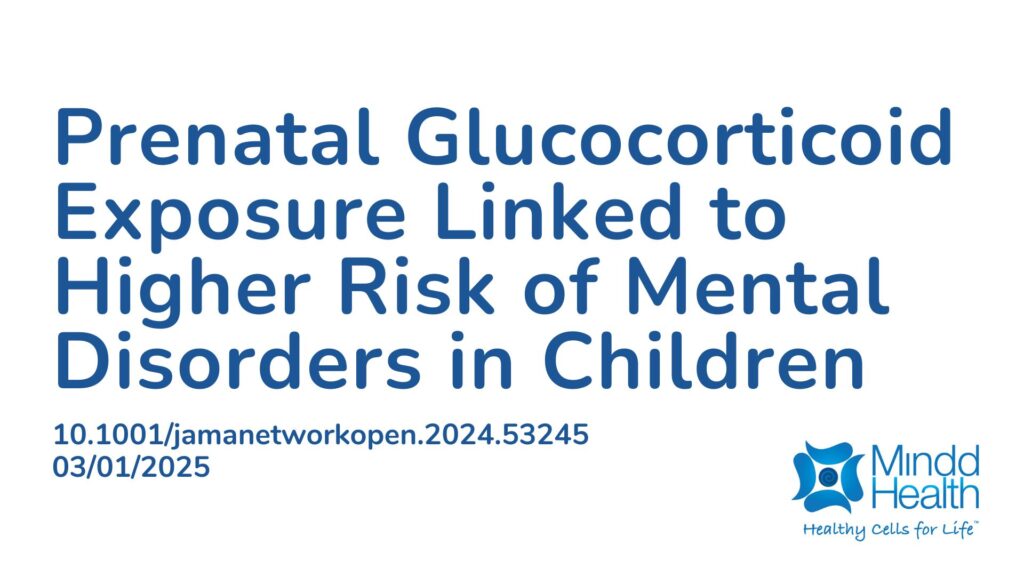Summary:
Glucocorticoids are commonly used during pregnancy to reduce risks associated with preterm birth and to treat autoimmune or inflammatory conditions. While these medications help manage inflammation and symptoms, excess prenatal exposure to glucocorticoids may affect fetal development and increase the risk of mental health issues in children. However, evidence linking glucocorticoid exposure to long-term mental disorders is limited, and further research has been recommended. Betamethasone and dexamethasone, which can cross the placenta, are often given to pregnant people at risk of early delivery. Comparing children exposed to glucocorticoids with those unexposed but born to mothers with similar conditions is needed to provide more accurate insights and research on this topic. Prednisolone, a glucocorticoid often used for autoimmune diseases, does not pass through the placenta. However, high doses over long periods may impact fetal development. Observational studies suggest links between high-dose prednisolone and anxiety, depression, or ADHD in children, but these studies face limitations. This Danish cohort study investigated mental disorders in children exposed to glucocorticoids before birth. The study included over one million children born between 1996 and 2016, with follow-ups until 2018. Among children of mothers at risk of preterm delivery, glucocorticoid exposure was associated with higher risks of autism, ADHD, and mood or anxiety disorders. Similar associations were observed in children of mothers with autoimmune conditions. In conclusion, prenatal exposure to glucocorticoids is linked to an increased risk of certain mental disorders in offspring. These findings highlight the need for caution when prescribing glucocorticoids during pregnancy.
Abstract:
Importance: Current evidence of the association between prenatal exposure to glucocorticoids and long-term mental disorders is scarce and has limitations. Objective To investigate the association between prenatal exposure to systemic glucocorticoids and mental disorders in offspring at the age of 15 years, comparing exposed vs unexposed offspring born to mothers with the same underlying disease (risk of preterm delivery and autoimmune or inflammatory disorders). Design, Setting, and Participants This nationwide population-based cohort study used data from registries in Denmark with follow-up until December 31, 2018. Participants included all Danish infants born alive from 1996 to 2016. Analyses were performed from January to December 2023. Exposures Prenatal exposure to systemic glucocorticoids. Main Outcomes and Measures Fifteen-year crude and adjusted risks, risk differences, and risk ratios (RR) for mental disorders using Kaplan-Meier estimator comparing exposed vs unexposed offspring born to mothers with the same underlying disease. Results A total of 1 061 548 infants (52% male) were included in the final study cohort, including 31 518 born to mothers at risk of preterm delivery and 288 747 born to mothers with autoimmune or inflammatory disorders. Among offspring born to mothers at risk of preterm delivery, the adjusted risks for exposed vs unexposed were 6.6% vs 4.3% (RR, 1.5 [95% CI, 1.2-1.9]) for autism spectrum disorders; 1.6% vs 1.3% (RR, 1.3 [95% CI, 0.8-1.8]) for intellectual disabilities; 5.8% vs 4.3% (RR, 1.3 [95% CI, 1.0-1.7]) for attention-deficit hyperactivity disorder (ADHD); and 7.2% vs 4.6% (RR, 1.5 [95% CI, 1.1-2.0]) for mood, anxiety, and stress-related disorders. Among offspring born to mothers with autoimmune or inflammatory disorders, the adjusted risks for exposed vs unexposed were 4.8% vs 3.8% (RR, 1.3 [95% CI, 1.1-1.5]) for autism spectrum disorders; 1.1% vs 0.8% (RR 1.4, [95% CI, 0.9-2.0]) for intellectual disabilities; 5.5% vs 4.4% (RR, 1.3 [95% CI, 1.0-1.5]) for ADHD; and 6.6% vs 4.6% (RR, 1.4 [95% CI, 1.2-1.8]) for mood, anxiety, and stress-related disorders. Findings were confirmed through an active comparator and sibling design. However, confounding by disease severity could not be ruled out. Conclusions and Relevance In this cohort study, prenatal exposure to glucocorticoids was associated with higher risk of some mental disorders. These data support continued caution in the use of glucocorticoids in pregnant people.
Article Publication Date: 03/01/2025
DOI: 10.1001/jamanetworkopen.2024.53245



